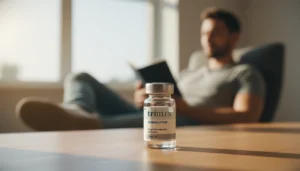How Do Compounding Pharmacies Make Semaglutide?

Introduction
In a world increasingly focused on health and wellness, the emergence of semaglutide as a prominent solution for weight management has sparked a revolution in the pharmaceutical landscape. Did you know that nearly one in eight U.S. adults have taken a GLP-1 agonist like semaglutide for weight loss? This statistic underscores the surging demand for effective weight loss medications. However, the growing popularity of semaglutide has led to significant shortages, prompting a wave of interest in compounded versions of this drug.
But what exactly are compounding pharmacies, and how do they create semaglutide? This blog post will delve into the intricate processes involved in the compounding of semaglutide, clarifying the role these pharmacies play in providing access to this essential medication. We will also explore the regulatory landscape surrounding compounded drugs, the safety and efficacy concerns associated with them, and the importance of obtaining medications from trustworthy sources.
By the end of this article, you will have a thorough understanding of how compounding pharmacies make semaglutide, the implications for patients, and how to navigate this complex marketplace. Together, we’ll explore the intersection of innovation and health, emphasizing TrimRx’s commitment to delivering safe, effective, and personalized weight loss solutions.
Understanding Compounding Pharmacies
What Are Compounding Pharmacies?
Compounding pharmacies specialize in creating customized medications tailored to the specific needs of individual patients. Unlike commercial drug manufacturers, compounding pharmacies can adjust formulations, dosages, and delivery methods based on a patient's unique medical requirements. This is particularly beneficial for patients who may have allergies to certain ingredients, require a different dosage than what’s commercially available, or need a medication in a different form (e.g., liquid instead of pill).
Compounding pharmacies operate under federal and state regulations, which ensure that their practices adhere to safety and quality standards. These pharmacies are licensed by state boards of pharmacy, and the compounding process typically begins with a prescription from a licensed healthcare provider.
The Role of Compounding in Drug Shortages
The current landscape of semaglutide and other GLP-1 medications has been heavily influenced by drug shortages. Since semaglutide (marketed under brand names such as Ozempic and Wegovy) has been added to the FDA's drug shortage list due to overwhelming demand, compounding pharmacies have stepped in to fill the gap. Under Sections 503A and 503B of the Food, Drug, and Cosmetic Act, compounding pharmacies are permitted to create medications that are in short supply, even if those medications are still under patent protection.
This unique regulatory framework allows compounding pharmacies to offer alternatives when commercial products are unavailable. However, it also raises questions about the quality and safety of compounded medications, particularly when they are not subject to the same rigorous FDA approval processes as branded drugs.
The Compounding Process for Semaglutide
Sourcing the Active Pharmaceutical Ingredient (API)
To begin the compounding process, pharmacies must obtain the active pharmaceutical ingredient (API) required to create semaglutide. This API must come from FDA-registered manufacturers, ensuring that it meets strict quality standards. The pharmacies need to verify that the API is accompanied by a valid Certificate of Analysis (CoA), which provides detailed information about the quality and purity of the ingredient.
Formulation Development
Once the API is sourced, compounding pharmacists develop the formulation for the compounded semaglutide. This involves determining the appropriate concentration of the API and selecting suitable excipients—inactive substances used to deliver the active ingredient effectively. While there are established guidelines for many older medications, the formulation of semaglutide is less straightforward due to its patented status, which means there is no official "recipe" available.
Pharmacists may refer to scientific literature, consulting firms, or their own expertise to develop the formulation. This process often requires extensive testing to ensure the final product's potency, stability, and safety.
Compounding and Sterilization
The actual compounding of semaglutide occurs in controlled environments to minimize contamination risks. Pharmacists mix the API with the selected excipients under sterile conditions, ensuring that the final product is safe for injection. Following the mixing process, the compounded solution is typically filtered into sterile vials for distribution.
To confirm the quality of the compounded semaglutide, pharmacies send samples to independent laboratories for testing. These tests assess the product for impurities and verify that it meets the necessary safety and efficacy standards before it is dispensed to patients.
Quality Assurance and Regulatory Compliance
Compounding pharmacies that produce semaglutide must adhere to strict quality assurance protocols. This includes maintaining detailed records of their sourcing, compounding processes, and testing results. While compounding pharmacies are regulated by state pharmacy boards, the level of oversight can vary significantly from one state to another.
Pharmacies engaged in sterile compounding are generally required to meet more stringent requirements, including regular inspections and adherence to the guidelines set by the United States Pharmacopeia (USP). These measures help ensure that compounded medications are safe and effective for patient use.
Challenges and Concerns with Compounded Semaglutide
Safety and Efficacy Issues
As the demand for compounded semaglutide has grown, so too have concerns about the safety and efficacy of these products. The FDA has issued warnings regarding the use of compounded semaglutide that may contain different chemical structures or impurities compared to FDA-approved formulations. Reports have surfaced of compounded products that lacked the correct concentration of semaglutide or contained contaminants, raising serious health risks for patients.
In particular, some compounding pharmacies have utilized salt forms of semaglutide, which are not recognized as safe and effective by the FDA. This has led to increased scrutiny and regulatory action from both the FDA and state pharmacy boards, emphasizing the need for caution when considering compounded medications.
The Importance of Transparency
Transparency in the compounding process is vital for patient safety. Patients must be aware of the risks associated with compounded medications and should only obtain them from licensed pharmacies. It is essential to inquire about the source of the API, the testing performed on the final product, and the pharmacy's compliance with regulatory standards.
At TrimRx, we are dedicated to ensuring that our patients receive safe and effective medications. Our partnerships with FDA-registered and inspected pharmacies allow us to provide compounded semaglutide with the highest quality assurance. We believe that safe weight loss solutions should be accessible, and we support our patients with personalized assessments and ongoing care.
Finding Safe and Effective Compounded Semaglutide
Tips for Patients
If you're considering using compounded semaglutide, it's crucial to approach the process with care. Here are some tips for ensuring you receive a safe and effective product:
- Consult Your Healthcare Provider: Always discuss your weight loss options with a qualified healthcare provider. They can guide you in determining whether compounded semaglutide is appropriate for your needs.
- Verify Pharmacy Credentials: Ensure that the compounding pharmacy you choose is licensed and regulated by your state’s pharmacy board. You can often find this information on the pharmacy’s website or by contacting them directly.
- Ask About Testing and Quality Assurance: Inquire whether the pharmacy conducts independent laboratory testing on their compounded products. Legitimate pharmacies should be transparent about their quality assurance processes.
- Avoid Unregulated Sources: Be cautious of online pharmacies that offer compounded semaglutide without requiring a prescription or providing adequate information about their products. Many of these sources may not comply with safety standards.
- Stay Informed: Keep up-to-date on FDA warnings and advisories concerning compounded medications. Being informed can help you make better decisions about your health.
Conclusion
The compounding of semaglutide represents a complex intersection of healthcare needs, pharmaceutical innovation, and regulatory challenges. While compounding pharmacies play a crucial role in providing access to essential medications, it is imperative for patients to remain vigilant about the quality and safety of compounded products.
At TrimRx, we are committed to supporting our patients on their weight loss journeys through personalized, medically supervised care. By partnering with FDA-registered pharmacies and offering comprehensive services, we strive to provide safe and effective weight management solutions tailored to individual needs.
As the demand for semaglutide continues to grow, so does the importance of understanding how compounding pharmacies operate and the implications for patient safety. Together, let’s navigate this evolving landscape and work towards achieving sustainable health and wellness.
FAQ
What is semaglutide used for?
Semaglutide is primarily used as a medication for weight management and to treat type 2 diabetes. It mimics the effects of glucagon-like peptide-1 (GLP-1), which helps regulate appetite and insulin secretion.
How does compounding differ from traditional pharmacy practices?
Compounding involves creating customized medications tailored to individual patient needs, while traditional pharmacies dispense commercially available medications that have undergone FDA approval.
Are compounded medications safe?
Compounded medications can be safe if prepared by licensed pharmacies following strict regulations. However, the safety and efficacy of compounded drugs can vary, so it is essential to choose reputable compounding pharmacies.
How can I ensure I receive safe compounded semaglutide?
To ensure safety, consult with a healthcare provider, verify the pharmacy’s credentials, inquire about testing and quality assurance processes, and avoid unregulated sources.
Where can I learn more about TrimRx's weight loss programs?
To explore our personalized weight loss programs and see if you qualify for prescription medications like semaglutide, we encourage you to take our free assessment quiz here. Together, we can embark on a journey towards healthier living.
In addition, for immediate support during your weight loss journey, check out our quick-access supplements, including GLP-1 Daily Support and Weight Loss Boost.

Transforming Lives, One Step at a Time
Keep reading
Semaglutide for Men: Dosing, Results and Special Considerations
Weight loss medications have traditionally been marketed toward women, but the reality is that men face obesity at nearly equal rates and often struggle…
Compounded Semaglutide Cost: Complete Pricing Guide 2026
You’ve learned that brand-name Ozempic costs nearly $1,000 per month, and you’ve heard that compounded semaglutide offers the same active ingredient at a fraction…
Understanding Low-Dose Semaglutide: A Gentle Start to Your Weight Loss Journey
Curious about what is a low dose of semaglutide for weight loss? Discover its importance for a safe start & how it minimizes side effects. Learn more!



